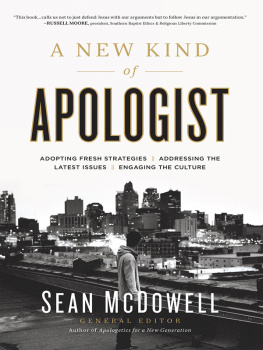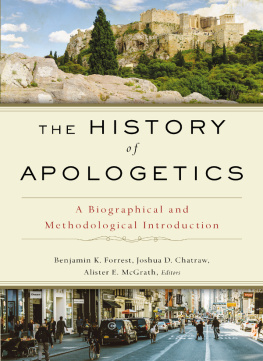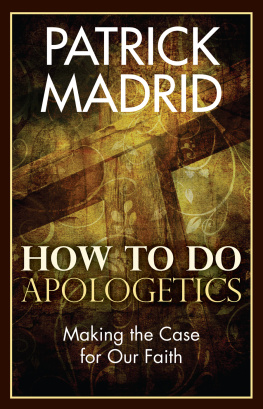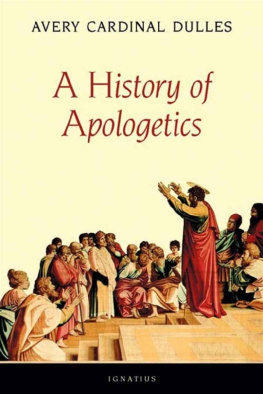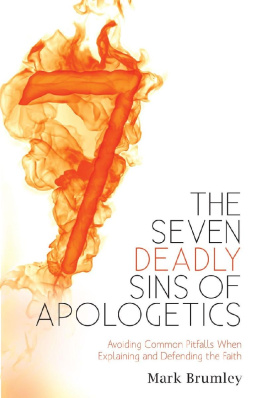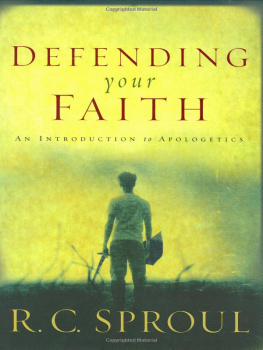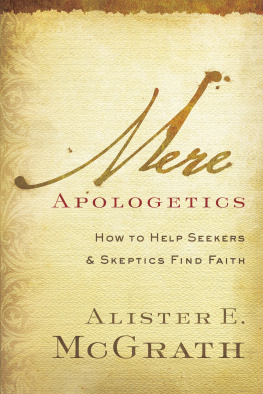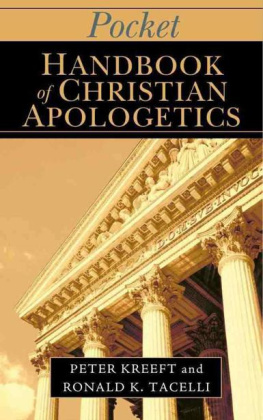The Seven Deadly Sins of Apologetics
Avoiding Common Pitfalls When Explaining and Defending the Faith
M ARK B RUMLEY
The Seven Deadly Sins of Apologetics
Avoiding Common Pitfalls When Explaining and Defending the Faith

San Diego
2014
The Seven Deadly Sins of Apologetics
Avoiding Common Pitfalls When Explaining and Defending the Faith
2014 by Mark Brumley
All rights reserved. Except for quotations, no part of this book may be reproduced or transmitted in any form or by any means, electronic or mechanical, including photocopying, recording, uploading to the Internet, or by any information storage and retrieval system, without written permission from the publisher.
Unless otherwise noted, biblical citations are taken from the Revised Standard Version of the Bible ( 1971 by Division of Christian Education of the National Council of the Churches of Christ in the United States of America).
Published by Catholic Answers, Inc.
2020 Gillespie Way
El Cajon, California 92020
1-888-291-8000 orders
619-387-0042 fax
catholic.com
Printed in the United States of America
978-1-938983-75-7 ISBN (print)
978-1-938983-76-4 ISBN (Kindle, electronic)
978-1-938983-77-1 ISBN (ePub, electronic)
Cover design by Devin Schadt
Interior design by Russell Design
To Debbie
Foreword
Go therefore, and make disciples of all nations, baptizing them in the name of the Father and of the Son and of the Holy Spirit, teaching them to observe all that I have commanded you; and lo, I am with you always, to the close of the age (Matt. 28:1820).
Simple, direct, no-nonsense. These words of Jesus are the greatest mission statement ever written. But in hearing this Scripture so many times in daily life, we can easily become dull to its power. So lets examine it.
First, it is not a suggestion or a request. It is a command. If we say we believe in Jesus Christ, we must preach the gospel. We must teach the Faith, and we must also explain and defend it. There is no Option B. Jesus does not need our polite approval. He does not want our support from the sidelines. He wants usour love, our zeal, our whole beingbecause through us he completes the work of salvation, which has never been more urgent for the world than right now.
Second, Jesus is not talking to somebody else. He is talking to you and me. Go make disciples of all nations could not be more personal. Jesus wants you. The work of evangelizingand its sibling, apologeticsis not just a job for professionals. We are the professionals by virtue of our baptism. If the responsibilities of your life prevent you from going to China or Africa, then witness to and defend your faith where you areto your neighbors, your coworkers, your friends. Find ways to talk about your faith with the people you know. Work to conform your life to the things you say you believe. Make your actions support your words, and your words, your actions.
Third, if Jesus speaks to each of us personally, it is because each of us personally makes a difference. God did not create us by accident. He made us to help him sanctify this world, and to share his joy in the next. The biggest lie of our century is that mass culture is so big and so complicated that an individual cannot make a difference.
This is false. This is the Enemys propaganda, and we should never believe it. We are not powerless. Twelve uneducated Jews turned the Roman world on its head. One Francis Xavier brought tens of thousands of souls to Jesus Christ in the Far East. One Peter Canisius brought tens of thousands of fallen-away Catholics back to the Church.
If Christians were powerless, the world would not feel the need to turn them into martyrs. The gospel has the power to shake the foundations of the world. It has done so many times. It continues to do so today. But it cannot do anything unless it is lived and preached, taught, explained, and defended. This is why the simplest Christian is the truest and most effective revolutionary. The Christian changes the world by changing one heart at a time.
Fourth, Jesus does not ask the impossible. If he tells us to teach all nations, it is because it can be done. Nothing is impossible with God. When Paul began his work, conversion of the Roman world seemed impossible. But it happened. When Mother Teresa began her work in Calcutta, no one had any idea she would touch people of all nations with her example of Christs love. But it happened. Do not worry about the odds. They do not concern us. Never be afraid to speak up for the truth. God will do the rest.
Fifth, Go make disciples of all nations means all nationsthe whole world and all its peoples. Jesus is not just an answer for some people. Or the answer for Western culture. He is not just a teacher like Buddha, or a prophet like Muhammad. He is the Son of God. And what that means is this: Jesus is the answer for every person, in every time, in every nation. There is no other God, and no other Savior. Jesus Christ alone is Lord, and the Catholic Church is the Church he founded. If anyone is saved, he is saved only through Jesus Christ and his Church, whether he knows the name of Jesus or not.
Ecumenical and interreligious dialogues are enormously valuable things. They form us in humility; they deepen our understanding of God; and they teach us respect for our brothers and sisters who dont share our faith but who sometimes radiate Christs love far better than we do. And yet even our sinfulness does not exempt us from preaching and defending the truth. If we really believe the Catholic faith is the right path to God, then we need to share it joyfully, firmly, with all people and in all seasons. We need to defend it with passion, courageand also with charity.
The bottom line is this: Our mission is to advance Gods work of redeeming and sanctifying the world. Our mission is to bring all people to salvation in Jesus Christ. That is our mission in community as the Catholic Church and individually as Catholic believers. Its a task of both truth-telling and of love.
The value of Mark Brumleys book is that he helps us see this clearly. He also gives us the tools to act on it. He is articulate, persuasive, balanced, and sensible; and the spirit he brings to this marvelously readable, useful work demonstrates Catholic apologetics at its best: zeal for the truth, informed by patience, respect, and love. I can offer no higher praise.
Most Rev. Charles J. Chaput, O.F.M. CAP.
Archbishop of Philadelphia
Introduction to the Second Edition
Nothing succeeds like success. A decade ago I could plausibly declare Catholic apologetics the comeback kid. Now it is not coming back; it is here in massive force.
Sure, a deeper penetration of apologetics into parish life would bear more even more fruit. And sure, Catholics still have a lot to learn and do when it comes to apologetics and its cousin, evangelization. But today we have an apologetics bonanza few would have predicted in the decades immediately following Vatican II. It is a veritable apologetics stampede. From publishing to broadcasting, from street evangelization to the Internet, from national apostolates to parish programs, Catholic apologetics is seemingly everywhere.
As a convert and an erstwhile professional apologist myself, I see this apologetics recovery as an immensely good thing. In fact, apologetics is an essential part of the Churchs evangelical mission, one to which recent popes constantly refer when, quoting their predecessor, St. Peter, they speak of believers duty to give reasons for the hope within them (cf. 1 Pet. 3:15). Moreover, the present resurgence of apologetics is a natural result of Vatican IIs call to engage the contemporary world and to read the signs of the times ( Gaudium et Spes 4); we should have been deeply worried if the council, as profoundly misunderstood as it has often been, had not borne such fruit.
Next page

